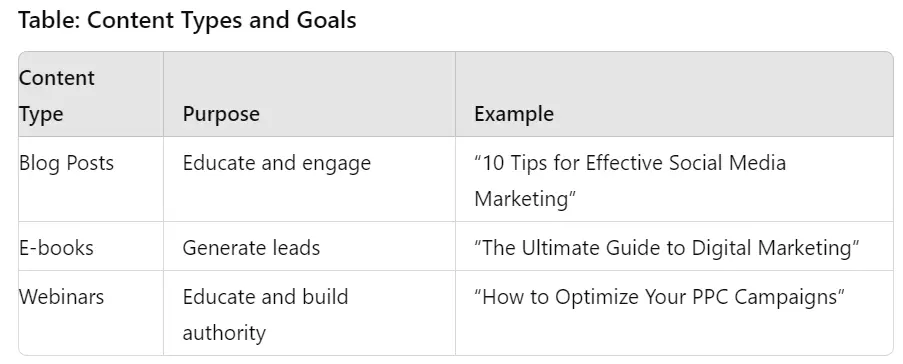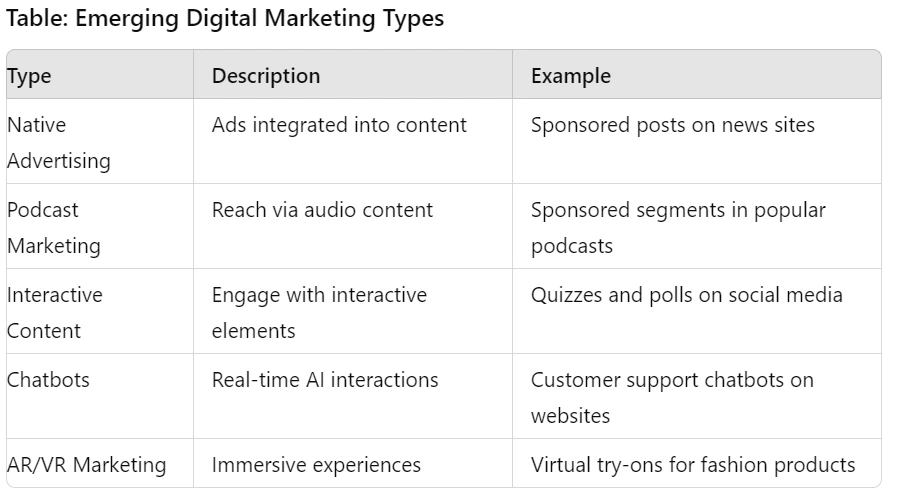Introduction to Digital Marketing
Digital marketing encompasses a wide range of domains designed to reach and engage target audiences online. Each type of digital marketing can be tailored to specific business objectives.
Below is a detailed breakdown of key digital marketing areas, along with examples and potential applications.
Types of Digital Marketing Strategies
Search Engine Optimization (SEO)
Search Engine Optimization (SEO) involves optimizing website content to improve its ranking in search engine results pages (SERPs) to drive organic traffic. For instance:
What Is The Local SEO?
Targeting local search queries (e.g., “best coffee shop near me”) to attract customers in specific geographic areas.
What Is The Voice Search Optimization?
Adapting content for voice queries (e.g., “What’s the best Italian restaurant nearby?”).
Table: Local SEO Vs. General SEO Metrics

What Is Content Marketing?
Content marketing involves creating and distributing valuable content to attract and engage a target audience. For example:
E-books and Whitepapers
Offering detailed industry insights in exchange for contact information.
Webinars
Hosting online seminars to educate and interact with an audience.
Table: Content Types And Goals

What is Social Media Marketing?
Using social media platforms to promote products, engage with customers, and drive traffic. Examples may include:
Social Media Contests
Running giveaways to increase brand visibility and follower engagement.
User-Generated Content
Encouraging customers to share their experiences with the brand.

Pay-Per-Click (PPC) Advertising
Definition: Paying for ads to appear on search engines or websites, with costs incurred per click. For suppose:
Display Advertising
Banner ads on various websites.
Retargeting Ads
Ads are shown to users who previously visited your site.

Email Marketing
Using emails to communicate with prospects and customers, promote products, or share updates. Examples:
Drip Campaigns
Automated series of emails triggered by user actions (e.g., sign-ups).
Newsletter Campaigns
Regular updates on company news, offers, and content.

Affiliate Marketing
Partnering with affiliates who promote your products and earn commissions on sales generated. Use Cases:
Coupon Sites
Websites offering discounts and deals.
Product Review Sites
Bloggers or reviewers who recommend products.

Influencer Marketing
Collaborating with influencers to promote products or services to their followers. Influencers such as:
Micro-Influencers
Influencers with smaller but highly engaged audiences.
Brand Ambassadors
- Long-term partnerships with influencers who consistently promote the brand.

Online Public Relations (PR)
Managing a brand’s online presence and reputation through media coverage and outreach. Examples:
Press Releases
Distributing news to online media outlets.
Media Outreach
Building relationships with journalists and bloggers.

Video Marketing
Creating and sharing videos to promote products, educate, or entertain audiences. For instance:
Live Streaming
Real-time broadcasting of events or Q&A sessions.
How-To Videos
Instructional videos demonstrating product usage.

Mobile Marketing
Reaching users on mobile devices through various channels. Examples:
In-App Advertising
Displaying ads within mobile applications.
Location-Based Marketing
Sending promotions based on user location.

Marketing Automation
Using software to automate marketing tasks and workflows. Examples:
CRM Integration
Automating interactions based on CRM data.
Behavioral Email Triggers
Sending emails based on user behavior.

Additional Digital Marketing Types
Native Advertising
Ads that blend with the content of the platform (e.g., sponsored articles).
Podcast Marketing
Sponsoring or creating podcasts to reach specific audiences.
Interactive Content
Engaging users with quizzes or polls.
Chatbots and Conversational Marketing
Real-time interactions via AI-driven chatbots.
Augmented Reality (AR) and Virtual Reality (VR) Marketing
Immersive experiences for showcasing products.

You might be Interested in Reading:
- What is IoT – Internet of “Things” ?
- NoSQL Graph Database
- Data Governance Program – Success Criteria
- Reference and Master Data Management – Guiding Principles
- Data Handling Ethics – Personal Data PIPEDA Principle and Description
- Data Governance Program – Scope
- RDM – Reference Data Management
- Linux Partitioning – Parted Throwing Warning

